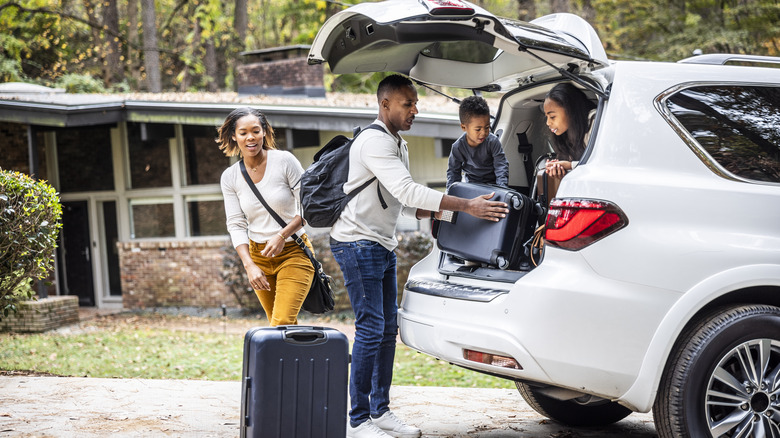The Best Ways To Determine If You Should Rent A Car Or Drive Your Own For A Road Trip
We may receive a commission on purchases made from links.
Nothing beats the classic road trip experience, with a tank full of gas, an upbeat playlist to keep you energized, and only the highway separating you from your destination. There's an exciting sense of freedom and spontaneity that comes with road tripping. That said, a little planning is essential for making sure your vacation goes off without a hitch, and one of the most critical steps to prepare for your next road trip is choosing between a rental car or your own vehicle.
Thankfully, Anthony Calhoun, an automotive expert and the author of "Your Dealership Service Advantage," has plenty of tips to help you decide. If your trip begins in your own driveway, then you may favor the convenience of using your own car over picking up a rental. However, Calhoun says there are several reasons to consider renting, including avoiding damage. "A long road trip can put significant mileage on your personal vehicle, leading to increased wear and tear. Renting a car means you don't have to worry about the long-term effects on your own car," he explains. Similarly, you can often expect rental cars to be more reliable and better maintained, reducing your chances of breaking down. Even if you do break down with a rental, the automotive expert notes that the vehicle agency will generally be responsible for providing roadside assistance and a free replacement car.
A rental is also a no-brainer if your everyday car doesn't suit your road trip needs, adds Calhoun. For instance, you may require a larger vehicle with more luggage space. You might also need different features for safety reasons. "If your trip involves specific needs, such as off-roading or driving in snowy conditions, you can rent a vehicle designed for those purposes, which might not be something you own," the automotive industry pro reveals.
The benefits of using your own vehicle for a road trip
Though rental cars have their benefits, there are also several advantages of using your own car for a road trip, according to Anthony Calhoun. One of the most obvious: saving money. "Renting a car can be expensive, especially for an extended period," he says. "You'll need to factor in the daily rental rate, insurance, taxes, fees, and potential costs for additional drivers or extras like GPS or car seats." These costs can be especially high if you choose the priciest place to rent your car from. Plus, there are sometimes hidden fees, warns the expert. Depending on your rental agreement, one such fee can include charges for exceeding mileage limits or traveling to another state. Rental car insurance can also cost you a pretty penny, and even with protection, you may be liable for the cost of any damages.
If you're picky about your vehicle, you might also prefer your own car over the ones offered by the rental company. Calhoun notes, "Depending on where you're renting and the time of year, the specific type of car you want might not be available." You may also not have access to specific accessories or modifications that you're used to, and you'll likely have to overcome a learning curve when driving an unfamiliar car. "This can make driving less comfortable, especially in terms of handling, control placement, or using features like the infotainment system or GPS," explains Calhoun.
Consider these points when choosing your road trip vehicle
Clearly, there are pros and cons to both rental cars and relying on your own vehicle. However, Anthony Calhoun suggests weighing five specific factors when planning for your road trip. Start by considering the condition of your car. "If your car is older or has higher mileage, it might not be as reliable for a long trip," the automotive professional shares. Rental cars tend to be new and regularly maintained, which can make for a safer trip. Calhoun also suggests considering the risk of wear and tear on your personal vehicle. Long road trips can rack up miles, diminishing the value of your car. If this is a concern, you may want to rent for your trip.
The third factor to note is fuel efficiency. Keeping your tank full can be costly, and cars that aren't fuel efficient will require more frequent stops at the pump. However, many rental companies offer fuel-efficient or hybrid vehicles, which could help you save throughout your vacation. Another point to take into account is insurance and liability. "Your personal insurance will cover you, but check if it covers long-distance trips or certain locations," suggests Calhoun. If it doesn't, renting may make more sense, though keep in mind that the rental agency's insurance can be expensive.
Finally, the car expert recommends determining what features and space you may need for your trip. If your car is easy to drive and has all the room you require for your luggage and fellow passengers, it may work just fine for your road trip. However, if you're short on space or looking for specific features that your own car lacks, a rental can be a more comfortable choice.
What to look for when renting a car
If you've chosen to rent a car for your road trip, don't hang up your decision-making hat just yet. You'll also need to decide which vehicle to reserve. Your options will depend on your location and rental car company, though there are a few specific things Anthony Calhoun suggests looking for. The first — and perhaps most obvious — is cost. Calhoun says that larger or premium vehicles generally come with higher rates, yet it's important to make sure the car you choose has sufficient space. You may also want a vehicle with features such as GPS navigation, phone chargers, and a lane-keeping system. Make a list of your must-haves and compare your options with your trip budget.
On that note, Calhoun also says to factor in gas mileage to get the most bang for your buck. If hybrid or fuel-efficient options are out of your budget, try renting the smallest car you can manage. The automotive expert notes that sedans and compact vehicles tend to get better gas mileage, though they don't offer as much space.
Another crucial detail to consider is the terrain and road conditions you'll be exposed to during your road trip. "If you're driving through rough terrain, mountainous regions, or rural areas, you might need a vehicle with all-wheel drive or higher ground clearance, such as an SUV," Calhoun explains. Certain weather conditions, such as snow and ice, should also influence what type of car and tires you choose.



